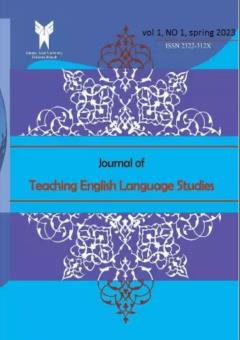The Impact of Iranian EFL Learner’s Interaction in an Online-based Instruction on Improving their Reading Skill
Subject Areas : Journal of Teaching English Language Studies
Mehrdad Rezaee
1
![]() ,
Mohammad Iman Askari
2
*
,
Mohammad Iman Askari
2
*
![]()
1 - Central Tehran Branch, Islamic Azad University
2 - Department of English Language, Central Tehran Branch, Islamic Azad University, Tehran, Iran
Keywords: reading comprehension, attitude, online instruction ,
Abstract :
This study tried to explore the impact of online instruction on Iranian EFL learners' reading comprehension. To this end, 60 language learners were chosen via convenience sampling from among a pool of 100 language learners. To achieve homogeneity among the participants, Oxford Placement Test was administered. Then, the participants were randomly assigned to two experimental vs. control groups randomly. The experimental group was treated in the telegram environment under online instruction. The control group, however, was taught through traditional method of teaching reading comprehension. Two instruments were employed in this study: reading comprehension test (pretest and posttest) and attitude questionnaire (pretest and posttest). As the result of this study show, online instruction has significant effects on both Iranian EFL learners' reading comprehension and attitude. This finding is helpful for language teachers and material developers, in a way that they should focus on the role of new technologies in the processes of language learning and teaching.
Anderson, N. J. (2003). Scrolling, clicking, and reading English: Online reading strategies in a second/foreign language. The Reading Matrix, 3, 1–33.
August, D. & Hakuta, K. (Eds.). (1997). Improving schooling for language-minority children: A research agenda. Washington, DC: National Academy Press.
Bacsich, P., Phillips, B., and Bristow, S. F. (2011). Learner Use of Online Educational Resources f or Learning (LUOER). Retrieved from http://www.jisc.ac.uk/media/documents/programmes/elearning/oer/LUOERLfinalreport.docx
Barroso, J. M. (2012) ‘Growth and jobs: next steps’, Presentation to the informal European Council of 30 January 2012. Accessed June 16 2013. http://ec.europa.eu/europe2020/pdf/cm012012_barroso_en.pdf
Bateman, P., Lane, A., & Moon, R. (2012). An emerging typology for analysing OER initiatives. In Cambridge 2012: Innovation and Impact – Openly Collaborating to Enhance Education, a joint meeting of OER12 and OpenCourseWare Consortium Global 2012, 16-18 April 2012, Cambridge, UK. Retrieved from http://oro.open.ac.uk/33243/1/
Beetham, H., Falconer, I., McGill, L., & Littlejohn, A. (2012). Open Practices: a briefing paper, JISC 2012. Retrieved from https://files.pbworks.com/download/S4brBZB4DW/oersynth/58444186/Open%20Practices%20briefing%20paper.pdf
Brooks, G., & Burton, M. (2010). European Adult Learning Glossary, Level 1. Brussels: European Commission. Retrieved from http://ec.europa.eu/education/more-information/doc/2010/adultglossary1_en.pdf
Bacsich, P., Phillips, B., and Bristow, S. F. (2011). Learner Use of Online Educational Resources f or Learning (LUOER). Retrieved from http://www.jisc.ac.uk/media/documents/programmes/elearning/oer/LUOERLfin
Barroso, J.M. (2012) ‘Growth and jobs: next steps’, Presentation to the informal European Council of 30 January 2012. Accessed June 16 2013. http://ec.europa.eu/europe2020/pdf/cm012012_barroso_en.pdf lreport.docx
Bateman, P., Lane, A., & Moon, R. (2012). An emerging typology for analysing OER initiatives. In Cambridge 2012: Innovation and Impact – Openly Collaborating to Enhance Education, a joint meeting of OER12 and Open Course Ware Consortium Global 2012, 16-18 April 2012, Cambridge, UK. Retrieved from http://oro.open.ac.uk/33243/1/
Beetham, H., Falconer, I., McGill, L., & Littlejohn, A. (2012). Open Practices: a briefing paper, JISC 2012. Retrieved from https://files.pbworks.com/download/S4brBZB4DW/oersynth/58444186/Open%20Pactices%20briefing%20paper.pdf
Eskey, D., & Grabe, W. (1988). Interactive models for second language perspectives on instruction. In P. L. Carrell, J. Devine, & D. Eskey (Eds.), Interactive approaches to second language reading (pp. 223-238). Cambridge: Cambridge University Press.
Grabe, W. (1991). Current developments in second language reading research. TESOL Quarterly 25 (3): 375-406.
Lee, J. F. (2003). Background knowledge and L2 reading. The Modern Language Journal, 70, 350–354.
Millrood, R. (2001). Teacher development series: Modular course in English teaching methodology. Cambridge University Press.
Moss & Newton. (2002). An Examination of the Informational Text Genre in Basal Readers. Reading Psychology.
Rashtchi, M. & Keyvanfar, A. (2007). ELT: Quick’n’easy (3rd Ed.). Tehran: Rahnama.
Widdowson, H. G. (1979). Explorations in applied linguistics. Oxford: Oxford University Press.
Xu, Y. (1999). The activation of phonology during silent Chinese word reading. Journal of Experimental Psychology: Learning, Memory, and Cognition, 25, 838–857.

